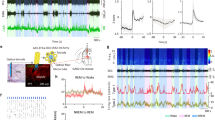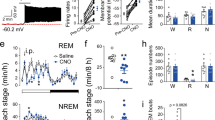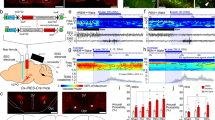Abstract
We generated mice with a selective loss of GABAB receptors in orexin neurons. Orexin neurons in these GABAB1<sup>-/-(orexin)</sup> mice showed reduced responsiveness to GABA<sub>A</sub> receptor agonists due to a compensatory increase in GABAA receptor-mediated inhibition. This increased GABA<sub>A</sub> receptor-mediated inhibition of orexin neurons is due to orexin-1 receptor-mediated activation of local GABAergic interneurons. Surprisingly, orexin neurons were also less responsive to glutamate, apparently because the augmented GABA<sub>A</sub> receptor-mediated inhibition increases the membrane conductance and shunts excitatory currents. These observations indicate that absence of GABA<sub>B</sub> receptors decreases the sensitivity of orexin neurons to both excitatory and inhibitory inputs. GABAB1<sup>-/-(orexin)</sup>mice exhibited severe fragmentation of sleep/wake states during both the light and dark periods without affecting total sleep time or inducing cataplexy, indicating that GABA<sub>B</sub> receptors are crucial regulators of orexin neurons and that "fine tuning" of orexin neurons by inhibitory and excitatory inputs is important for the stability of sleep/waking states.
Similar content being viewed by others
Article PDF
Author information
Authors and Affiliations
Corresponding author
Rights and permissions
About this article
Cite this article
Sakurai, T., Matsuki, T., Takahira, H. et al. Selective loss of GABAB receptors in orexin/hypocretin-producing neurons results in disrupted sleep/wakefulness architecture. Nat Prec (2007). https://doi.org/10.1038/npre.2007.1195.1
Received:
Accepted:
Published:
DOI: https://doi.org/10.1038/npre.2007.1195.1



